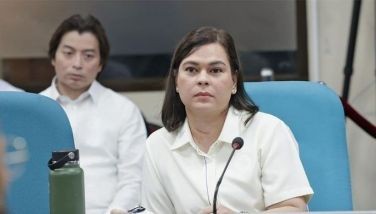Cancer Awareness Month

As the coronavirus infectious disease 2019, or COVID-19 for short, spreads across the globe, a much fatal ailment called cancer continues to claim millions of lives on a worldwide scale also each year.
Thus, it is no surprise why the Cancer Coalition Philippines (CCPh) is calling upon the government to fully implement Republic Act (RA) 11215, otherwise known as the National Integrated Cancer Control Act (NICCA). Speaking through their president Paul Perez, the CCPh addressed this call in particular to the Department of Health (DOH) as the principal government agency mandated to implement the NICCA.
This month marks the first anniversary of the enactment of the NICCA that also declared every February of each year to be observed as Cancer Awareness Month.
We highlighted this observance during our Kapihan sa Manila Bay at Café Adriatico in Remedios Circle, Malate last Wednesday as we invited oncologist doctors and advocates dedicated in extending assistance to cancer-stricken patients and their families. We featured oncology doctors Jorge Ignacio, head of the University of the Philippines-Philippine General Hospital (UP-PGH) Cancer Institute, and Rachael Marie Rosario who is the executive director of the Philippine Cancer Society (PCS). Also, Lourdes Desiree Cembrano, policy director of the Pharmaceutical and Healthcare Association of the Philippines (PHAP) joined the conversations during our weekly Kapihan sa Manila Bay breakfast news forum.
Cembrano disclosed cancer is a leading cause of death worldwide accounting for 9.6 million deaths in 2018, according to the World Health Organization. Based on WHO record, Cembrano cited, the most common cases, she said are lung, breast, colorectal, prostate, skin and stomach cancers. In the case of the Philippines, Dr. Rosario disclosed, cancer is the second leading cause of death. Projections point to an 80 percent increase of cancer incidence in the next 11 years, Dr. Rosario warned. Only last year, I lost my eldest sister due to breast cancer.
So it was with heavy heart to learn during our Kapihan sa Manila Bay from our resource speakers at the CCPh that the implementing rules and regulations (IRR) of the NICCA have yet to be issued. According to the CCPh, they took part in the crafting of the IRR for NICCA as among the stakeholders who were able to complete them in August last year. Up to present though, the IRR remains unpublished in national dailies that would make it effective.
The CCPh takes pride as being instrumental in the drafting and enactment of the NICCA that President Rodrigo Duterte signed into law on Valentine’s Day last year. Among other things, RA 11215 spelled out the national framework to combat cancer. The CCPh, founded in July 2016, is a national coalition of cancer patient organizations, health care providers, cancer advocates and champions engaging and working with government, policy makers, private sector, civil society, and international development partners.
Perez is a father of a cancer survivor. He recalled his active involvement at the CCPh started after his eldest son Seve who was then three years old fell ill of leukemia, a kind of cancer of the blood. Trying to save his son, Perez who is an advertising executive, could only thank God in helping his family give a new lease on life to Seve. Totally cured from leukemia, Seve is now 17 years old and would soon graduate from Grade 12 at Ateneo High School this year. Seve is second of the eight children of Perez who later founded Project Brave Kids as his way of giving back the help their family received to save Seve to help other cancer-stricken children.
Also a key step to implementing this landmark law, Perez pointed out, is the creation of the 14-man National Integrated Cancer Control Council, which in coordination with the DOH, will function as the policymaking, planning and coordinating body on cancer control in the country. The NICCA mandates the Council to “provide technical guidance and support and oversee the implementation of this Act, ensuring judicious and best use of available resources for the benefit of all, especially the most vulnerable sectors of the society, the elderly, women and children, the poor, marginalized and disadvantaged.”
Perez and Rosario admitted they were nominated to represent the cancer patients’ organizations and doctors groups, respectively. However, they both pointed to the more important thing that the Council should be activated at the soonest time by appointing first the members. As provided under NICCA, the appointment of Council members will come from the Office of the President.
Known for supporting cancer-stricken children at the Southern Philippines Medical Center in Davao City, President Duterte would surely act with dispatch once he gets to know the delay of the IRR of NICCA and the appointment of the Council members.
Ignacio shared the laments of Perez saying they, too have been “waiting” for the implementation of the law. He cited as example the provision that effectively amends the Philippine Drug Formulary containing the list of medicines that government hospitals can procure. While new medicines are already available in the market, Ignacio deplored these are still not yet included in the current formulary. “So even if there are medicines which we think are good for our patients, we cannot give it to them,” he rued. Once the NICCA becomes fully implemented, Ignacio believes it would greatly benefit the poor and low-income patients who will be able to access funds needed for the expensive treatment.
Rosario added the CCPh is also looking forward to the inclusion of the “Cancer Assistance Fund” (CAF) as mandated under the NICCA under the 2021 budget that the national government is now working out with the 18th Congress.
Cancer is likened to a death sentence to a person who could only cling to hope of getting a reprieve from an act of God. Improving access to and affordability of cancer treatments can only be achieved through collaboration of all, if only everyone is not just aware but also cares.
- Latest
- Trending





























